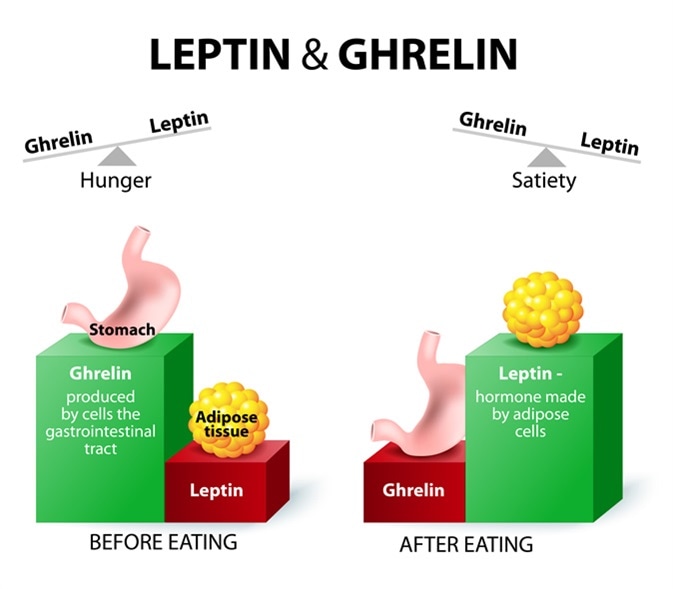Ghrelin and leptin are two hormones that are of great interest in appetite regulation. Leptin is commonly considered anorexigenic (i.e., appetite suppressant), while ghrelin is orexigenic (i.e., appetite stimulant).
They are secreted in a reciprocal rhythm, influenced by the neuropeptide Y (NPY) system in the hypothalamus, which is acted upon by these afferent hormones. This highly specific system shows rhythmic secretion, imparting, in turn, the same pattern to the expression of appetite and feeding behavior.

Leptin the satiety hormone. Ghrelin the hunger hormone. When ghrelin levels are high, we feel hungry, after eating, ghrelin levels fall, and we feel satisfied. Image Credit: Designua / Shutterstock
Leptin and Ghrelin on Body Weight
Leptin inhibits ghrelin in two ways; it reduces ghrelin secretion by gastric cells and suppresses ghrelin receptors' expression in the NPY system, therefore preventing the stimulation of feeding behaviors by the latter. This effect is postulated to constitute the major feedback loop between the organs of eating and the hypothalamus, which maintains body weight.
When this loop is disrupted at any point, either in terms of timing, duration, or magnitude of feedback impulse signaling, hypothalamic loss of feeding is lost, resulting in obesity. Leptin also increases the rate of thermogenesis and thus promotes weight maintenance.
Ghrelin, on the other hand, stimulates feeding and results in obesity. It is produced in the stomach and also in the hypothalamic subparaventricular zone, which has an appetite-stimulant action. Ghrelin levels rise before a meal and go down after meals.
Moreover, ghrelin levels fluctuate in accordance with changes in energy reserves in the body. Thus ghrelin is episodic in secretion, but the amplitude depends upon the feeding status. This hormone is also involved in the short-term regulation of human appetite.
Experimentally, even when the same diet is fed to different rodents, two categories are rapidly formed: the first is obesity-prone and starts to put on weight rapidly, whereas the second group shows a static weight. This can be explained by the fact that the first group alone shows high leptin levels, with low ghrelin levels, possibly caused by the former. Conversely, the other group has no alteration in the secretion of both hormones.
Hypothalamic Restraint by Leptin
In another study, leptin lowering was associated with high ghrelin secretion levels, but there was a centrally-operating suppression of the expected appetite drive despite increased ghrelin. Ghrelin secreted in the stomach mucosa circulates to the brain and crosses the blood-brain-barrier. It acts together with locally secreted ghrelin in the hypothalamus to stimulate the NPY and other neurons in the ARC-PVN nucleus to stimulate the appetite. This can be inhibited by Y1 receptor antagonists acting on the NPY neurons.
Leptin acts to reduce the synthesis, release, and biological actions of NPY in the ARC-PVN neuronal system via long leptin receptor activation. Yet leptinopenic mice (i.e., those with low levels of leptin) failed to develop a good appetite, though their ghrelin levels rose. Thus the hypothalamic restraint exercised by leptin overrides even a strong peripheral afferent signal by ghrelin.
Actions of Ghrelin
There are several notable actions that ghrelin has on the human body:
- It regulates the blood glucose levels through reduced insulin secretion and regulates the synthesis and breakdown of glucose and glycogen.
- It reduces heat production to conserve energy.
- It reduces sympathetic activity.
- It promotes the differentiation and fusion of muscle fibers.
- It plays a role in regulating bone growth through osteoblast differentiation and proliferation, a role in bone protection, and an opposing role in bone metabolism.
- It is also highly expressed in metastatic cancer cells.
When the body is in positive energy balance, ghrelin levels go down, and vice versa in fasting or anorexia nervosa. Leptin does exactly the opposite; however, it is unclear whether the primary stimulus is calorie deprivation or the lower energy stores.
In anorexic eating disorders, the ghrelin levels are chronically raised, which may be due to the body’s energy's negative state. They are meant to stimulate the appetite to increase body fat percentage. Nevertheless, it may also mean that such patients are unresponsive to ghrelin.
Appetite, Obesity, and the Brain
References
Further Reading
Last Updated: Feb 17, 2021